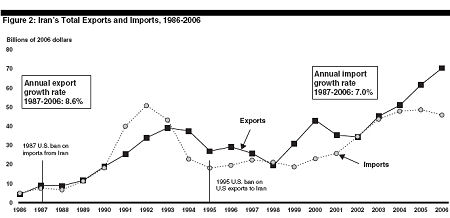
Mahmoud Ahmadinejad
The General Accounting Office (GAO) today released a report on the effectiveness of the unilateral sanctions imposed by the United States on Iran. The report cast doubt on the effectiveness of these sanctions and criticized the agencies charged with enforcing the sanctions for failing to make any efforts to assess or to determine the effectiveness of these sanctions.
The broad details of the report are neither surprising or particularly controversial. The report notes that because Iran’s oil-based economy makes it a key player in the global economy, U.S. bans on exports to, and imports from, Iran have been followed by substantial increases in exports from, and imports to, Iran. A timeline graph in the report makes this point eloquently:

The report also notes that transhipment of goods from the U.S. to Iran through third countries also compromises the effectiveness of the sanctions:
According to officials at key U.S. export enforcement agencies, the trade ban may be circumvented by the transshipment of U.S. exports through third countries. Officials identified several locations that serve as common transshipment points for goods destined for Iran. These locations include Germany, Malaysia, Singapore, the United Kingdom, and, according to Commerce officials, the United Arab Emirates (UAE) in particular.
Two trends underscore the possibility that U.S. goods are being shipped to Iran through the UAE. First is the considerable growth in U.S. trade flows through the UAE. The United States has become the number one supplier of imports to the UAE and Iran is the UAE’s largest trade partner.
The inclusion of the U.K. and Germany in the list of common transshipment points is a bit surprising, but indicates that exporters can’t ignore the possibility of transshipment based on the country to which the item is being exported.
Finally, the report notes that the Departments of State, Commerce and Treasury, all of which enforce the Iran sanctions, do not engage in any systematic review of the effectiveness of these programs. The Treasury Department, in its response to the GAO findings, took issue with this:
The Treasury Department continues to assess the effectiveness of its authorities that have been used against Iranian entities or Iranian interests. These assessments, which are not publicly available, are designed to determine the specific impact of Treasury actions and their success in meeting policy goals.
Of course if these assessments are, like double secret probation, kept secret, the wisdom of the sanctions is effectively removed from criticism by the U.S. businesses that are negatively impacted by the sanctions.
 Permalink
Permalink
Copyright © 2008 Clif Burns. All Rights Reserved.
(No republication, syndication or use permitted without my consent.)

 Posted by
Posted by  Category:
Category: 

